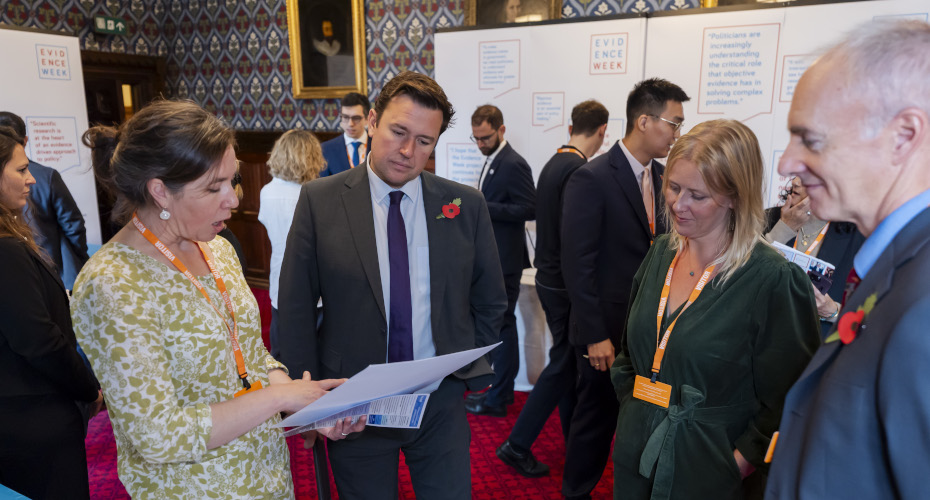Exeter researchers meet MPs to give insight on ways to tackle climate change and pollution

Picture by James Gifford Mead
Researchers from the University of Exeter met with Members of Parliament in Westminster to present their latest insights on pollution in our water systems and unique ways to fight climate change.
As part of Evidence Week in Parliament, research teams from Exeter made policy recommendations and highlighted the need to review current policies considering the latest available evidence. Evidence Week is a unique annual meeting that brings together the public, parliamentarians and researchers from across the UK to discuss how evidence is used and reviewed in Parliament.
Kelly Thornber, Ross Brown, and Caroline Farmer presented their latest insights on pollution within our water system from pharmaceuticals used in healthcare.
Pharmaceuticals generate considerable chemical pollution across their life cycle. Studies have shown extensive contamination of UK soils, rivers, crops and drinking water with pharmaceuticals including antibiotics, anti-depressants and hormones. This poses risks to both environmental and public health by contributing to biodiversity loss and rising levels of antimicrobial resistance (AMR).
The team at Exeter worked with a large Consortium of stakeholders from across the pharmaceutical life cycle to identify 37 intervention targets as a foundation for a national pharmaceutical pollution mitigation strategy.
Kelly Thornber, CEO of the Pharma Pollution Hub and Associate Member of the University of Exeter said: “We were thrilled by the response we got from the MPs and Peers. Pharmaceutical pollution from UK healthcare is a cross-sectoral issue that doesn’t clearly sit in any one policy domain so has been slipping through the cracks between the health, environment and business sectors for far too long. The MPs we spoke to were really supportive of the need for a systems-based future UK sustainable pharmaceutical strategy, and we got both valuable advice and offers of support for taking this forward.”
Meanwhile, Professor Paul Halloran, Professor Tom Bell (from Plymouth Marine Laboratory), and Guy Hooper presented their latest insights on the potential, the risks, and why the UK is uniquely positioned to explore ocean-based carbon-removal as a way to fight climate change.
The UK has committed to Net Zero but can’t achieve that without large-scale carbon removal. The ocean already absorbs a quarter of human-made CO₂ and research from Exeter shows the ocean could provide a scalable solution.
The Seawater Carbon Unlocking and Removal (SeaCURE) project built and ran the UK’s first marine Carbon Dioxide Removal pilot plant, as well as looking holistically at all of the questions surrounding if and how such an approach could reach a scale where it could meaningfully help reduce climate change. The pilot plant successfully extracted CO₂ from seawater and produced near-pure CO₂ for storage. Operating this approach to decarbonise one per cent of the ocean’s surface annually could in theory remove nearly one-third of today’s global emissions, but the research points to a number of important questions that need to be robustly assessed before anything like this scale of operation could take place.
The UK is uniquely positioned to lead on ocean-based CO₂ removal, and with the right policy framework, the project’s findings suggest that the UK could be the one of the best place globally to deploy marine-based approaches to remove CO2 from the atmosphere.
Professor Paul Halloran said: “It was a privilege to be able to take part in Evidence Week and speak to so many highly engaged MPs, Lords and their teams. The interest and enthusiasm for our research on marine Carbon Dioxide Removal was incredible. We now look forward to working with many of those who spoke to, to reinforce the UK’s role a global leader in this key aspect of our Net Zero future.”
The Exeter researcher presented their findings to, amongst others, Andrew George MP, Bayo Alaba MP, Calvin Bailey MP, Carla Denyer MP, Emily Darlington MP, Gill Furniss MP, Jeff Smith MP, John Milne MP, Kerry McCarthy MP, Sadik Al-Hassan MP, Sian Berry MP, Steve Race MP, Tom Collins MP and Wera Hobhouse MP, equipping them with vital information to inform the decisions they make on future policies for meeting net zero goals.
Evidence Week, now in its eighth year, is run by the campaigning charity Sense about Science, in partnership with the Quadram Institute, the UK Statistics Authority, communities and research institutions from across the UK. During the week, MPs meet with leading scientists to get the latest insights on pressing issues covering topics as varied as Artificial Intelligence, health, sports gambling and prison management. It is an opportunity for the public, parliamentarians and researchers to come together to share knowledge and insights.
It also empowers legislators to engage with evidence and equips them with the critical tools to handle uncertainty, identify bias and scrutinise underlying assumptions.
Tracey Brown, Director of Sense about Science, said: “MPs must engage with an astounding breadth of subjects and sources any given week. This is why Evidence Week in Parliament offers two days of rapid-fire briefings on cutting-edge tools and insights with some of the UK’s leading research groups. We’re delighted that MPs have the chance to hear directly from the University of Exeter about their new insights on carbon dioxide reduction strategies that can support the UK’s Net Zero strategy.”



